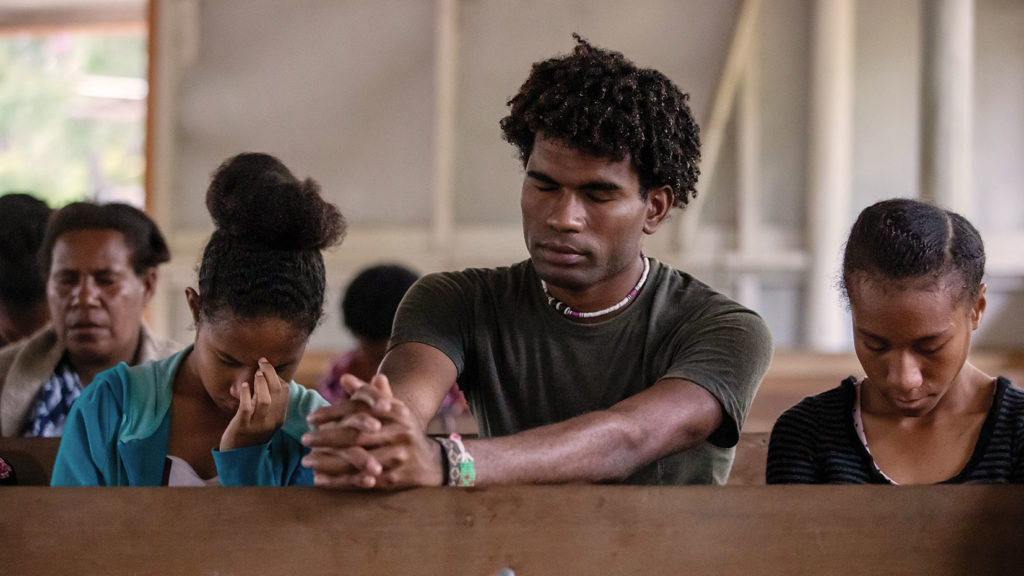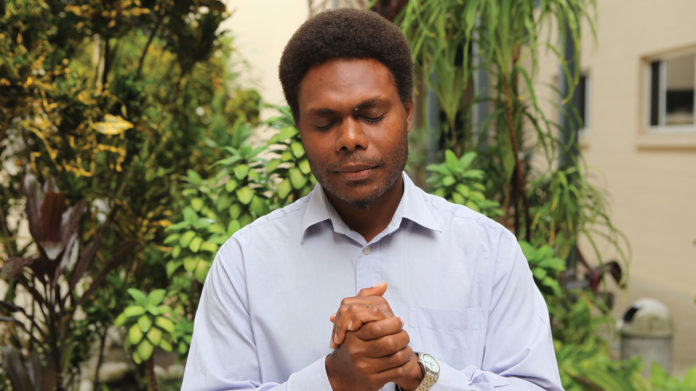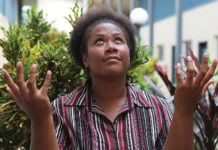I am not a robber, nor do I intend to become one. But when these intruders enter your home, office, shop or bank to rob it, often the first thing they do is cut off the communications. They cut the phone line—and take your mobile phone. They do this so that you are unable to call for the police or any other help. This gives them time to do their damage, and when you are finally able to call the police, it is too late—the criminals are gone and you have lost what they came for.
These culprits—we call them raskols in Papua New Guinea—are no fools. They know that with a telephone, police will be called and they will be dealt with. Therefore, for their best convenience and your worst, they take away your ability to call for help.
As it is in the physical world, so it is in the spiritual. It is the wildest wish of the worst raskol of all—the devil—to cut off our connection with God. Through and by prayer, we commune with God, maintaining our forever relationship with Him, thanking Him, putting to Him our never-ending requests, including our everyday situations and struggles with life. Prayer is so important and the devil knows this. That is why his first and foremost task is to cut off that form of communication with heaven. He knows how helpless and hopeless we are without prayer. His desire is for us to have weak or non-existent prayer lives.
How is it with your prayer life? Is it on the decline? Is it suffering? At its lowest ever? Have you lost interest in prayer? Are you giving up? Could this be because the devil is attempting to get you off heaven’s phone line? If so, he is robbing you of something precious.
The apostle Paul, a champion of prayer, admonishes us: “Pray without ceasing” (1 Thessalonians 5:17, NIV). What he is saying is this: “Pray every time, everywhere, for anything and everything. Don’t ever let a moment pass by without a prayer.”
Paul was a man of prayer. Because of this, there was power in his life’s journey—not only as a missionary, but more so as a Christian. He knew the benefits of prayer. He knew prayer brought untold blessings. No wonder, wherever he went and to whomever he wrote, he encouraged them to pray always, at all times. He went further, assuring them that he was praying for them. His wish for his church members was to “imitate me, just as I also imitate Christ” (1 Corinthians 11:1).
Another powerful servant of the Lord, American Adventist pioneer Ellen White, said, “Prayer is the breath of the soul.” To appreciate the point she was making, we must remember that to live this physical life, we need to eat food and to drink water—and it is essential that we breathe in order to live. These three are the basic necessities of human life. But we can survive without food and water for some days, if needed.
In 2000, while I was studying at Pacific Adventist University (PAU), strong currents swept two Kiribati fishermen onto the shores of New Ireland. They could not speak English or understand Tok Pisin. The government authorities needed another Kiribati national to help interpret. They contacted PAU and my good friend and neighbour Daniel Langley—originally from Kiribati—assisted them. He discovered that these two fishermen had drifted on the open sea for three weeks without food and water—and survived. This story and others like it prove that humans can survive without food and water for some time.
But it is different with air. No-one can go without oxygen for a day, a morning or even an hour. As I write this, the world record for a man holding his breath—he was underwater—is 22 minutes. He underwent strenuous preparation and practice to be able to achieve this incredible feat. Most of us would struggle to hold our breath for more than a minute or two.
With breathing, we can never do as we do with food and water: take a deep breath in the morning, store it up and wait until early afternoon when we breathe in the next lot. No way! To do so would be signing our own death warrant.
Just as air is a moment-by-moment necessity to our physical wellbeing, so is prayer to our spiritual life. As air keeps the physical life going, so prayer keeps the spiritual life going. It is as simple as that: no air, no life; no prayer, no life! This is the point Ellen White stresses in her short, but powerful statement: “Prayer is the breath of the soul.” And it blends well with Paul’s command to “Pray without ceasing.”
We humans need prayer for our spiritual survival. Otherwise, we are starving ourselves and will eventually face spiritual death. When we are not praying enough, we can feel as if we are stagnant and hollow within. We are encouraged to pray without ceasing because prayer truly is the breath of the soul.

Our daily bread
For balance in our spiritual life, we dare not live only on prayer. There are other necessities too. We need to feed on the Word of God daily. It is not enough to take our fill of the Word during church worship and think we will survive the whole week without it, until the next Sabbath. Just as the children of Israel received their manna every morning—on a daily basis—so are we to pick up our daily bread every morning through the study of the Word.
Feeding on the Word is actually feeding on Jesus Christ who is the manna that came down to us from above (see John 6:32–58). Consequently, He tells us that the Scriptures “testify of Me” (John 5:39). And in teaching about prayer, He instructed His disciples to pray: “Give us this day our daily bread” (Matthew 6:11). So there is bread to pick up each day—bread for our physical lives and bread for our spiritual lives.
Imagine I have two dogs, Tiger and Spiro. I feed Tiger on a daily basis and Spiro once every week. Tell me if there would be any differences between the two dogs? Of course! Tiger, being fed every day, would be a much healthier dog. Poor Spiro, fed only once a week—well, I am sure you can imagine what his health would be like. Philip Samaan was right on target when he said, “Yesterday’s meal, no matter how ample and satisfying it was, is not sufficient for today.”
So, when to study the Word? Early morning works well for many. In a sense, we are copying the children of Israel when we open the Word in the mornings. They gathered the manna in the mornings (see Exodus 16:21). We too are on an Exodus journey and having the manna—the Bread of Life—is just as important.
With prayer, however, we must not make it only a morning or evening exercise. It must be constant and consistent—a moment-by-moment exercise. That is what it means to pray without ceasing. We do not necessarily need to close our eyes or be on bended knees in every situation. But we can pray when we are eating, walking, working, talking, listening or in any other engagements. Whatever our circumstances, we can still offer a silent prayer to God. For myself, even while preaching, I often send a quick silent prayer to God when I do not feel the power: “Please, Lord, empower the message.”
Prayer seminars or reading books about prayer are helpful and give guidance, but the best way to an active prayer life is to begin praying. Today is the day to begin.
A proud Eastern Highlands man, Zuzai Hizoke has pastored around PNG and is currently undertaking further study in Michigan, United States. This article is adapted with permission from his book on the essentials of prayer, Keeping Connection (2015, Signs Publishing Company), which can be purchased from your local Adventist Book Centre (see page 57 for locations).







